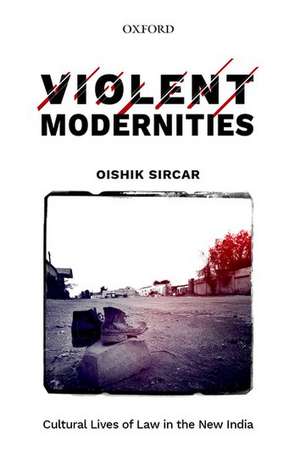Violent Modernities: Cultural Lives of Law in the New India
Autor Oishik Sircaren Limba Engleză Hardback – 19 noi 2021
Preț: 293.56 lei
Preț vechi: 357.68 lei
-18% Nou
Puncte Express: 440
Preț estimativ în valută:
56.17€ • 61.21$ • 47.33£
56.17€ • 61.21$ • 47.33£
Carte disponibilă
Livrare economică 22-28 martie
Preluare comenzi: 021 569.72.76
Specificații
ISBN-13: 9780190127923
ISBN-10: 0190127929
Pagini: 370
Dimensiuni: 146 x 221 x 24 mm
Greutate: 0.46 kg
Editura: OUP INDIA
Colecția OUP India
Locul publicării:Delhi, India
ISBN-10: 0190127929
Pagini: 370
Dimensiuni: 146 x 221 x 24 mm
Greutate: 0.46 kg
Editura: OUP INDIA
Colecția OUP India
Locul publicării:Delhi, India
Recenzii
This is a book of dazzling erudition [that is] not channeled into the disinterested pursuit of critique as enlightenment, but a constant questioning of the theorist as activist, and the activist as theorist... Violent Modernities in chapter after chapter [is] an expression of love as a brawl with law for space—the space to invoke, listen to and perform law differently—in a quest marked by grace and daring.
One of the things that I have enjoyed and learned from the book is that Sircar's work brilliantly brings together a range of cutting-edge theoretical conversations on law, to shed light on our contemporary cultural-governmental landscape. The aim of the book seems to be more of engaging the difficulty and thinking through complexity itself, rather than arriving at a 'successful' explanatory schema. This aspect of the book, moving back and forth from a subject position of scholar/activist in the field of legal/cultural history to a subject position of progressive experiential political subject with the consciousness and limitations of its own history makes the work more interesting and thoughtful in terms of the experimenting with the formal structure and style of the work.
Oishik Sircar writes beautifully, drawing from a wide range of themes and literature that is truly admirable. The book... invokes a daunting amount of theory from various fields. My idea of the empirical was vastly expanded as Sircar deals with a host of data, both primary and secondary: legal history, survivor testimonies and visual archives as primary sources and a humungous amount of reading of secondary literature... [It is a] disturbing but dazzling book.
[Violent Modernities] presents an engaging account of law as the conduit of violence against the liberal accounts of law that often negate these realities... [The book] is an important contribution to not only critical legal scholarship on violence and modernity (where writings from within the discipline of law are rarer than they should be), but also an interesting insight into the growth of [Sircar's] ideas through time and shifting locations.
[Violent Modernities] documents meticulously that law was a central terrain where the promises of liberalism either remained unrealised or were, in fact, realised only to reveal that they entailed more violence and exclusion than its exponents assumed [...] Written from a left-critical perspective... the book is of interest both to those working on India and its law and to those thinking about the relationship between law and the global resurgence of the far right.
One of the things that I have enjoyed and learned from the book is that Sircar's work brilliantly brings together a range of cutting-edge theoretical conversations on law, to shed light on our contemporary cultural-governmental landscape. The aim of the book seems to be more of engaging the difficulty and thinking through complexity itself, rather than arriving at a 'successful' explanatory schema. This aspect of the book, moving back and forth from a subject position of scholar/activist in the field of legal/cultural history to a subject position of progressive experiential political subject with the consciousness and limitations of its own history makes the work more interesting and thoughtful in terms of the experimenting with the formal structure and style of the work.
Oishik Sircar writes beautifully, drawing from a wide range of themes and literature that is truly admirable. The book... invokes a daunting amount of theory from various fields. My idea of the empirical was vastly expanded as Sircar deals with a host of data, both primary and secondary: legal history, survivor testimonies and visual archives as primary sources and a humungous amount of reading of secondary literature... [It is a] disturbing but dazzling book.
[Violent Modernities] presents an engaging account of law as the conduit of violence against the liberal accounts of law that often negate these realities... [The book] is an important contribution to not only critical legal scholarship on violence and modernity (where writings from within the discipline of law are rarer than they should be), but also an interesting insight into the growth of [Sircar's] ideas through time and shifting locations.
[Violent Modernities] documents meticulously that law was a central terrain where the promises of liberalism either remained unrealised or were, in fact, realised only to reveal that they entailed more violence and exclusion than its exponents assumed [...] Written from a left-critical perspective... the book is of interest both to those working on India and its law and to those thinking about the relationship between law and the global resurgence of the far right.
Notă biografică
Sircar is Associate Professor, Jindal Global Law School, Sonepat, Haryana
